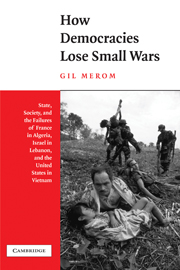 How Democracies Lose Small Wars
How Democracies Lose Small Wars Postscript
Published online by Cambridge University Press: 05 June 2012
Summary
It is impossible to resist the temptation of referring to the Israeli-Palestinian conflict, if only because its special characteristics provide a challenging opportunity for a review of the utility of this book's thesis and concepts. Yet such an enterprise is also intimidating. Venturing analysis and qualified predictions concerning an evolving conflict of this sort is akin to skydiving on a stormy night, when even the best of parachutes may fail. Indeed, while I act on temptation as I submit the following preliminary analysis, I do so with trepidation.
In order to understand the implication of my thesis for understanding recent developments in the Israeli-Palestinian conflict, it is essential to present first its contours and special features. The most fundamental point to note is that the conflict involves a powerful democracy, an occupied community, and sharp asymmetrical relations. Considering these, it is not surprising that whenever the conflict turns violent, it assumes characteristics of a “democratic small war.” The Palestinians resort to insurgency and terror, and Israel responds with counterinsurgency. Indeed, the cycle of violence that started in September 2000 reminds one of events that occurred in other small wars, and particularly during the French war in Algeria.
At the same time, the Israeli-Palestinian conflict is also marked by significant idiosyncrasies. First, while the actual violence is bilateral, it cannot be totally separated from the much larger Israeli-Arab conflict, which is of a different nature than small wars.
Information
- Type
- Chapter
- Information
- How Democracies Lose Small WarsState, Society, and the Failures of France in Algeria, Israel in Lebanon, and the United States in Vietnam, pp. 251 - 260Publisher: Cambridge University PressPrint publication year: 2003